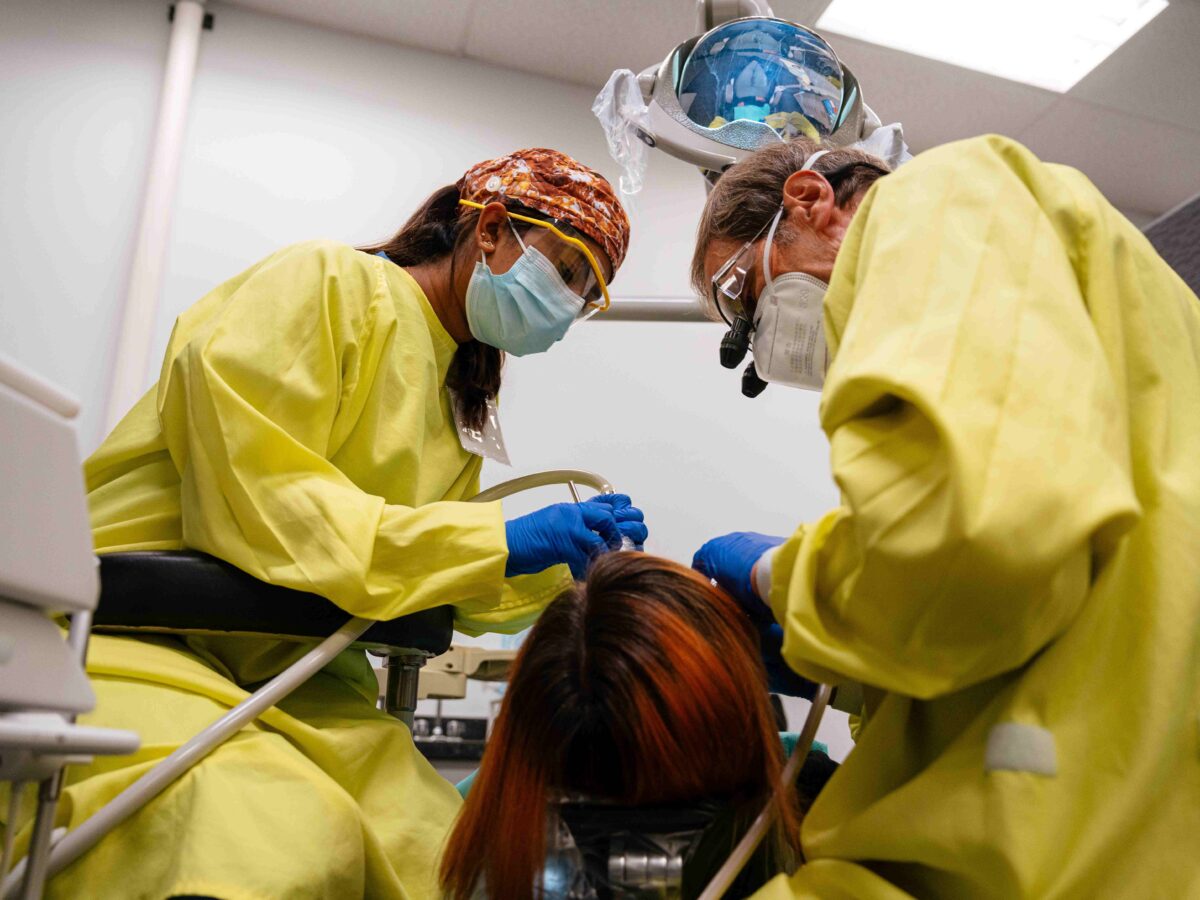Overview:
- Tylenol may soon have a warning label about the dangers of the drug for expectant moms.
- Pregnant women have few safe choices for over-the-counter pain and fever treatment.
- The drug will continue to be available without a prescription.
By RON FRENCH
Bridge Michigan
This story was originally published by Bridge Michigan (bridgemi.com), a nonprofit and nonpartisan news organization. To get regular coverage from Bridge Michigan, sign up for a free Bridge Michigan newsletter here.
Michigan doctors say President Donald Trump’s warning that the use of Tylenol during pregnancy could cause autism has led to confusion and consternation among expectant families, physicians and researchers.
Studies have reached inconsistent conclusions on the impact of acetaminophen — the active ingredient in some over-the-counter pain and fever medications — and the largest study indicates no connection between drugs like Tylenol and increased risk of autism in children.
On Monday, Trump proclaimed that “taking Tylenol is no good” and discouraged its use by pregnant women and babies. Tylenol’s manufacturer, Kenvue, said “sound science clearly shows that taking acetaminophen does not cause autism.”.
The Autism Alliance of Michigan estimates there are about 50,000 people in the state diagnosed with autism.
Here’s what you need to know:
What has changed?
Trump and the Food and Drug Administration announced that a warning label will be added to drugs that contain acetaminophen, “to reflect evidence suggesting that the use of acetaminophen by pregnant women may be associated with an increased risk of neurological conditions such as autism and ADHD in children.”
The agency also issued a related letter to physicians nationwide.
Tylenol and related drugs will continue to be available on pharmacy shelves without a prescription.
What drugs contain acetaminophen?
Examples are Tylenol, along with Excedrin, Mydol, Dayquil/Nyquil, and some formulations of Robitussin, Mucinex and Sudafed. Discovered in the late 1800s, acetaminophen became widely used in the mid-1950s and is considered a safe and effective pain reliever.
One of the most recommended drugs in the world, its overuse has been linked to deaths or liver damage in rare cases, according to Harvard Health.
Can expectant mothers switch to a different pain and fever drug?
No they can’t, said Dr. Ann Gillett-Elrington, an obstetrics and gynecology specialist at Western Wayne Family Health Centers.
Studies show other over-the-counter drugs, such as Ibuprofen (Advil, Motrin), Naproxen (Alleve) and aspirin can be dangerous to a fetus.
“They’ve been associated with the lowering of amniotic fluid,” Gillett-Elrington said.
An FDA statement on Monday’s announcement warned pregnant women from switching to other over-the-counter pain relievers, saying aspirin and ibuprofen have “well-documented adverse impacts on the fetus.”
What does the research say?
Studies have yielded mixed results over connections between Tylenol and autism.
A Harvard study found that mothers who took acetaminophen gave birth to children more likely to be diagnosed with autism than moms who didn’t take the drug during pregnancy. That same study, though, cautioned that the findings didn’t necessarily mean that Tylenol caused autism.
Other studies found “associations” between prolonged use of acetaminophen during pregnancy and elevated risks of neurological disorders in children, but cautioned more study is needed.
The largest study conducted on the issue found no connection between the drug and autism.
Should pregnant women ‘tough it out’ without Tylenol?
Trump suggested Monday that women try to “tough it out” when they have pain or a fever rather than taking acetaminophen.
That’s a bad idea, Gillett-Elrington said, because fever can be dangerous to a fetus.
She told Bridge she continues to recommend Tylenol to expectant moms for “run of the mill” fevers, with limits of two 500-milligram tablets at a time and no more than eight in a 24-hour period.
If not Tylenol, what is causing the increase in autism?
Diagnosed cases of autism in the US have skyrocketed in recent years, with prevalence rising from 1 in 150 children in 2000 to 1 in 31 in 2022, according to data from the Centers for Disease Control.
That rise is at least partially attributable to more conditions falling under the broad label of autism and greater awareness, said Dr. Sarah Mohiuddin, director of autism research at Michigan Medicine.
The major cause of autism is genetics — people inheriting a heightened risk of autism from their parents, Mohiuddin said.
The researcher said the theories about Tylenol causing autism come from small studies, and that scientists look at the results of multiple studies before drawing conclusions.
MORE FROM PLANET DETROIT
Detroit named toughest city for asthma sufferers in new report
Detroit tops the 2025 Asthma Capitals report, highlighting the city’s struggle with high asthma rates, ER visits, and asthma-related deaths, underscoring the urgent need for systemic change.
Free Detroit medical clinic expands services: ‘It’s just a beautiful thing’
The Malta Clinic moved to a new Woodward Avenue location this year and is adding dermatology to the services it offers.
Q&A: Mary-Jacqueline Muli, the Climate Justice Nurse, on how climate change manifests at the patient’s bedside
The floods in Detroit in 2021 are when Mary-Jacqueline Muli “really got activated,” she says. The cardiac ICU nurse is the founder of the Climate Justice Nurse.
So what are families to believe?
Marisa Brizzolara, the Grand Rapids mother of an 11-year-old son diagnosed with autism, said Monday’s announcement is “causing more confusion” for some families. She would like to see more attention on how to improve the lives of those with autism rather than “fear-mongering tactics.”
Gillett-Elrington said expectant moms often come to her office after having consulted “Dr. Google and chat groups” to address their fears.
“With proper education and assurance, the benefits of taking the medication (Tylenol) outweigh the risks,” Gillett-Elrington said. “If I were in that situation, I would take it. I recommend it for my family members.”
UM researcher Mohiuddin said: “people should trust their doctors,” adding that “doctors are not going to recommend treatments that will put you at risk.”
What concerns doctors about the administration’s warning?
Dr. Brad Irving, an ob-gyn at University of Michigan Health-West, near Grand Rapids, said he is concerned that more expectant mothers will decline to take Tylenol to reduce fever because of what he views as political reasons.
Fevers during pregnancy are associated with pre-term birth, fetal distress and, in early pregnancy, can lead to miscarriages, Irving said.
“When you make a blanket statement based on questionable science, you’re going to cause a lot of fear that may not be justified,” Irving said. “You can feel the fear, the mistrust. We’re seeing more interruptions and barriers to care.
“Pregnancy is a vulnerable state,” Irving said. “The choices that a mother makes can impact the welfare of that child. That vulnerability begets anxiety.”
This article first appeared on Bridge Michigan and is republished here under a Creative Commons Attribution-NoDerivatives 4.0 International License.





